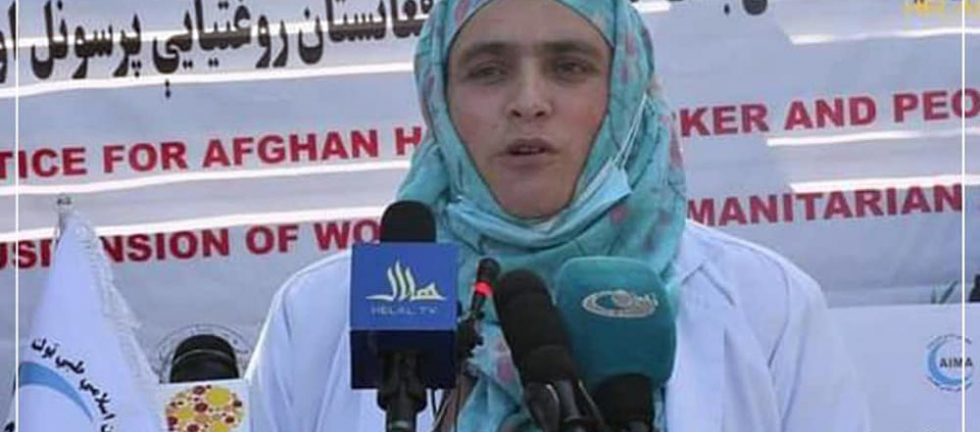Afghan Midwives Association president Ms. Fahima Naziri and AMA executive board members participated in Press release regarding the recent stand of the World Bank on suspension of its financial support to the health services in Afghanistan
Afghan Midwives Association president Ms. Fahima Naziri and AMA executive board members participated in Press release regarding the recent stand of the World Bank on suspension of its financial support to the health services in Afghanistan which was organized by Federation of Afghanistan Medical Associations (FAMA) and Alliance of Health Organizations (AHO) on 2nd of September in Kabul.
Following the recent political changes, Afghanistan has entered to an unprecedented humanitarian crisis coupled with millions have displaced, unemployment strikes with the already overloaded Covid disastrous impact. Even prior to the recent political changes, Afghanistan was in the low human development category—positioning it at 169 out of 189 countries. The current withdrawal of donors would further deteriorate the humanitarian crisis and could lead to a possible collapse of basic humanitarian services provision. According to the UN Secretary-General’s statement on Afghanistan stating that: “Today, almost half of the population of Afghanistan – 18 million people – need humanitarian assistance to survive. One in three Afghans do not know where their next meal will come from. More than half of all children under-five are expected to become acutely malnourished in the next year. People are losing access to basic goods and services every day.
A humanitarian catastrophe looms. Now more than ever, Afghan children, women and men need the support and solidarity of the international community.” Despite all these facts; unfortunately, the Word Bank, as one of the main donors and Funding Manager for Afghanistan’s health sector, has paused funding for projects including the health and nutrition sector in Afghanistan, following their board decision on 24 August 2021. This decision will definitely impact the lives of the most vulnerable people and in the short-term cause:
1-Shut down of 2331 hospitals and health clinics
2-Lay off of more than 25142 health professionals including more than 7500 female health staff who will lose their jobs,
3-It will further deeply limit access of more than 35 million inhabitant of the country throughout all 34 rovinces to basic and life-saving health and nutrition services, and, as an impact; it is expected that at least 150 pregnant mothers will die per day. It will be the worst
- “Everyone has the right to a standard of living adequate for the health and well-being of himself and of his family, including food, clothing, housing and medical care and necessary social services, and the right to security in the event of unemployment, sickness, disability, widowhood, old age or other lack of livelihood in circumstances beyond his control.
- Motherhood and childhood are entitled to special care and assistance. All children, whether born in or out of wedlock, shall enjoy the same social protection.”
Additionally, Article 10.4 of the World Bank constitution/agreement articulating the Bank’s economic and political impartiality, yet the World Bank decided to pause/halt the financial supports for all the projects including the health and nutrition sectors in Afghanistan. This appears to be in conflict with both the Universal Declaration of Human Rights and Bank’s constitution/agreement.
Thus; we, the Federation of the Medical Associations (FAMA), and the member NGOs of Alliance of Health organizations (AHO), on behalf of the people of Afghanistan calling on the following Stakeholders: On the World Bank, USAID, EU, and all other donors:
To urgently and immediately review their decisions regarding the abrupt pausing/halting of their funding to avoid possible health and nutrition crises as well as the sudden collapse of the available health and nutrition sector capacity and infrastructure through taking feasible alternative options. such as direct contracting with BPHS/EPHS implementing NGOs and/or through an independent financial management body such as World Health Organization or other United Nations agencies.

